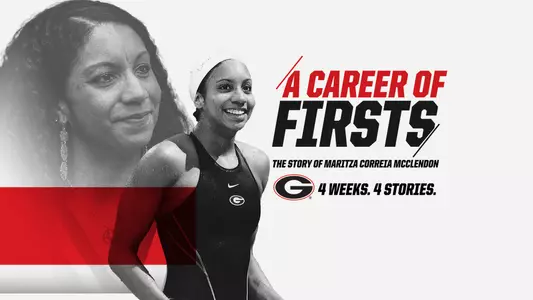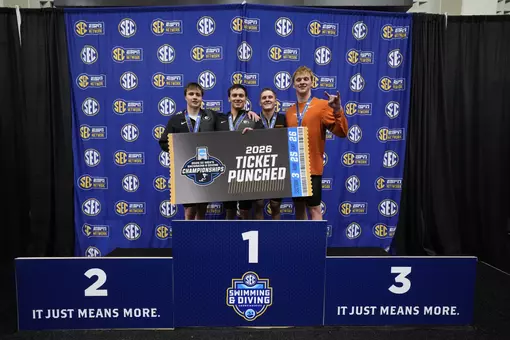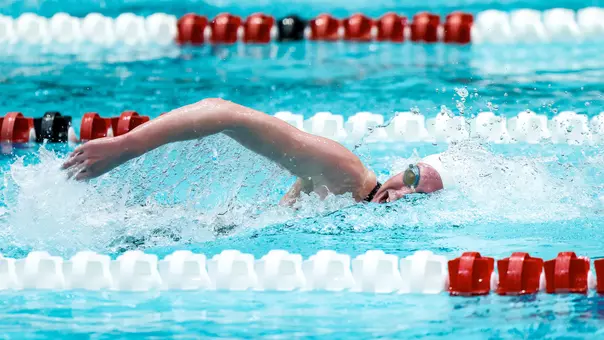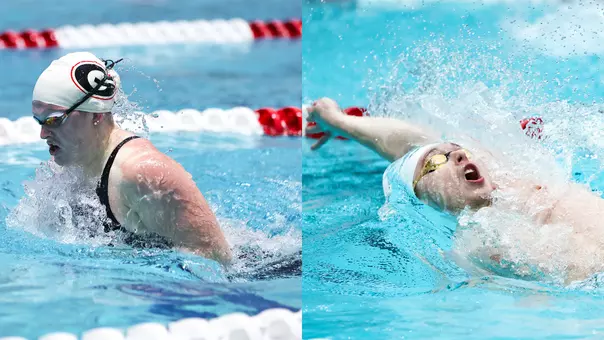University of Georgia Athletics

A Career Of Firsts
February 07, 2019 | General, Swimming & Diving, The Frierson Files
As Georgia celebrates Black History Month, each Thursday in February we will take a close look at an extraordinary former Bulldog. This week it's swimmer Maritza Correia McClendon, followed in the coming weeks by basketball's Derrick Floyd, track star Keturah Orji and football's Benjamin Watson.
By John Frierson
Staff Writer
Swimming, Maritza Correia McClendon reminds us, is the only sport that also is a life-saving skill. That's not something you think about when you're a kid leaping into the pool to do a cannonball or racing your buddy from one end to the other, but it's true.
McClendon, one of the greatest swimmers in Georgia's rich history, who made plenty of history herself, spends a good amount of time promoting swimming as a life-saving skill, and a sport for life. In her work with Swim 1922, a program that's a partnership between USA Swimming and the sorority Sigma Gamma Rho — two groups very dear to McClendon's heart — she aims to teach African Americans and other minorities how to swim.
After first getting involved with Swim 1922 in 2012, she said, "I absolutely fell in love with the purpose and the cause and the reason why we are doing it. I was like, this is going to make a difference, absolutely, especially for women."
When the program first began, studies showed that about 70 percent of African Americans didn't know how to swim. That number now, McClendon said, is down to 64 percent. There's much more work to be done, yes, but McClendon and everyone involved in Swim 1922 are potentially saving lives with every swim lesson they give — while also growing and diversifying the sport.
"I couldn't be happier for her and what she's doing with that program," said her coach, Jack Bauerle, Georgia's Tom Cousins Swimming and Diving Head Coach. "I mean, how important is that?"
Swimming is a life-saving skill, and for McClendon, it was also life changing.
Born in Puerto Rico to parents from Guyana, McClendon grew up in Florida. At age 7 she first started swimming a lot on her doctor's orders: she had scoliosis and her doctor thought swimming would help strengthen her back and correct the curvature of her spine. Years and countless laps later, by the time she was a high school senior being heavily recruited by the top schools, Bauerle said, "she was the best swimmer in Florida."
When Maritza Correia arrived at Georgia in the fall of 1999, she became the first African-American woman to swim for the Bulldogs, nearly 20 years after Randy Grimes was the first African American on the men's team.
"It was never discussed, it was never talked about," Bauerle said of McClendon being the first African-American woman to swim for Georgia. "Ritz was a swimmer as far as I was concerned, and a heck of a swimmer."
Georgia's swimming and diving programs have been rich in diversity over the years, but mainly on the international level, with swimmers from all over the world. This year's men's and women's squads include Youssef Said of Egypt, Freida Lim of Singapore, Gabi Fa'amausili of New Zealand and Canadian Javier Acevedo, the son of Chilean and Nicaraguan immigrants. But Camden Murphy, from Michigan, is Georgia's only African-American swimmer this season.
McClendon said more and more elite-level African American swimmers are coming along, but "I think it will take years for it to change and for us to see more, especially getting scholarships to D-I schools."
Not only was McClendon Georgia's first female African-American swimmer, in 2002 she set the American record in the 50-yard freestyle, becoming the first African American to have an American record (she also set the record in the 100). By the time she wrapped up her stellar Georgia career, McClendon had earned 11 NCAA titles and was a 27-time All-American.
"I was aware of how few of us (African-American swimmers) were there and I wanted to make sure that I made a statement and made my mark in what I wanted to accomplish," she said. "And I wanted to do it because I was a swimmer, not an African-American swimmer."
One of her Georgia teammates, Stefanie Williams Moreno, was another all-time great, a 28-time All-American (the most a swimmer can achieve). They swam a lot of the same events and pushed each other day after day after day. McClendon was inducted into Georgia's illustrious Circle of Honor in 2015 and Williams Moreno joined her in 2016.
"No matter what we were doing, whether it was practice or competing, I think we brought the best out in each other," said Williams Moreno, an associate head coach at Georgia. "She was there to help me push through and vice versa. ... Whether it was dual meets, SECs or NCAAs, we were racing each other."
McClendon's range in the freestyle was one of her greatest assets: she won SEC titles in the 50, 100, 200, 500 and 1,650.
"We'll never see that again," Bauerle said. "And that was at a time when you had us and Auburn and Tennessee and Florida, all really good programs. You're talking a heck of a level — I don't even know how to equate it."
In 2002, she had been pestering Bauerle to let her swim the 50 at the SEC Championships rather than the 500, with the hope of then swimming the 50 at the NCAA Championships. Bauerle, telling the tale, said he told her that if she swam fast enough at SECs to have reached the final of the 50 at the previous year's NCAAs, he'd let her swim the 50 at that season's NCAAs.
So what did McClendon do? She won the 50 at the SECs and then set the American record at the NCAAs.
"It was like, 'Here you go, Jack,'" Bauerle said with a big laugh and bigger smile.
In 2004, McClendon became the first African-American woman to make the U.S. Olympic swim team, later earning a silver medal as part of the 400-meter freestyle relay team.
"When (McClendon) made the team in 2004, I had missed making the finals ... and I could have been sad or upset because I didn't reach my dream or my potential," Williams Moreno said, "but I remember her walking or running down and I was the first person to give her a hug. I was so proud because she was able to reach her goals and aspirations."
This summer will mark 15 years since those U.S. Olympic Trials.
"Don't say it! Oh my gosh!" McClendon joked.
In an illustrious, barrier-busting swimming career with so many first-place finishes and many other firsts, being the first African American woman on the U.S. Olympic swim team is perhaps McClendon's most notable achievement. It still means a great deal to her to have been the first.
"I think honor" is the word that comes to mind, she said. "I think looking back and breaking those barriers, I remember the first interview I did after making the team, saying that I was proud to be the first but I definitely don't want to be the last."
And she wasn't. Lia Neal won a bronze medal during the 2012 Games in London and a silver in Rio in 2016. Most notably, Simone Manuel because the first African-American woman to win an individual gold medal, tying for first in the 100-meter freestyle in Rio. Manuel, who had contacted McClendon years before and the two had gotten to know one another pretty well, gave a shout-out to McClendon for helping pave the way in an interview after the race.
"It was pretty cool when she got that gold medal and shouted out my name," McClendon said. "It was kind of like, wow, pure amazement. Goosebumps, tears, happy, joy, everything."
McClendon lives in the Atlanta area with her husband Chad and two children and swimming is still a big part of her life. She doesn't churn out the laps the way she once did — no more 5:30 a.m training sessions for her — but she is passionate about her work with Swim 1922 and gives clinics and does speaking engagements. Usually, she brings her Olympic silver medal along.
"I want kids to see it," she said, so they can see what's possible if you have a passion and a dream.
"To me, that medal is something that's really important to show kids, because it's motivation. They've never seen anything like that. They're like, 'Oh my gosh, it's heavy, it's real,' and I love to share the stories behind that medal."
It's a special story, the story of a special woman that made her dreams come true.
John Frierson is the staff writer for the UGA Athletic Association and curator of the ITA Men's Tennis Hall of Fame. You can find his work at: Frierson Files. He's also on Twitter: @FriersonFiles and @ITAHallofFame.









